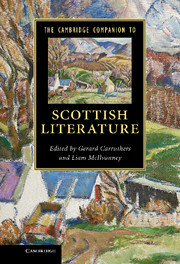Book contents
- Frontmatter
- Contents
- Notes on Contributors
- Acknowledgements
- Chronology
- Introduction
- 1 Scottish Literature before Scottish Literature
- 2 The Medieval Period
- 3 Reformation and Renaissance
- 4 The Aftermath of Union
- 5 Robert Burns
- 6 Enlightenment, Romanticism and the Scottish Canon
- 7 Scott and the Historical Novel
- 8 The Gaelic Tradition
- 9 Scottish Gothic
- 10 Victorian Scottish Literature
- 11 Robert Louis Stevenson
- 12 Hugh MacDiarmid and the Scottish Renaissance
- 13 Popular Fiction
- 14 Muriel Spark
- 15 The Glasgow Novel
- 16 ‘What is the language using us for?’
- 17 The Emergence of Scottish Studies
- 18 Otherworlds
- 19 Scottish Literature in Diaspora
- Index
- References
4 - The Aftermath of Union
Published online by Cambridge University Press: 05 January 2013
- Frontmatter
- Contents
- Notes on Contributors
- Acknowledgements
- Chronology
- Introduction
- 1 Scottish Literature before Scottish Literature
- 2 The Medieval Period
- 3 Reformation and Renaissance
- 4 The Aftermath of Union
- 5 Robert Burns
- 6 Enlightenment, Romanticism and the Scottish Canon
- 7 Scott and the Historical Novel
- 8 The Gaelic Tradition
- 9 Scottish Gothic
- 10 Victorian Scottish Literature
- 11 Robert Louis Stevenson
- 12 Hugh MacDiarmid and the Scottish Renaissance
- 13 Popular Fiction
- 14 Muriel Spark
- 15 The Glasgow Novel
- 16 ‘What is the language using us for?’
- 17 The Emergence of Scottish Studies
- 18 Otherworlds
- 19 Scottish Literature in Diaspora
- Index
- References
Summary
In his now classic The Paradox of Scottish Culture: The Eighteenth-Century Experience (1964), David Daiches divides Scottish writers after the Union into two camps, arguing that ‘Those poets who did not emigrate to England and write in English in an English tradition either wrote in Scotland in English for an English audience or turned to a regional vernacular poetry in a spirit of sociological condescension, patriotic feeling, or antiquarian revival.’ Influenced by the notion of a ‘Caledonian Antisyzygy’ proposed in G. Gregory Smith’s Scottish Literature: Character and Influence as well as T. S. Eliot’s account of ‘The Metaphysical Poets’, Daiches also suggests that writers after the Union suffered from a ‘dissociation of sensibility’ caused by thinking in one language (Scots) and writing in another (English, the language of power). Daiches’s assessment was initially important in helping to raise awareness of some of the socio-political factors influencing eighteenth-century Scottish literature and has proved extremely influential over the years as critics have grappled with its implications and revised it accordingly. In the Grammar of Empire, for example, Janet Sorensen comments that this assessment of a Scottish ‘split [schiz] mind [phrene]’ pathologises Scottish literature by positing a central, organic national identity against which Scottish national identity appears always already flawed. More recently, in Scottish and Irish Romanticism, Murray Pittock characterises post-Union Scottish writing not in terms of a lack or a splitting but in terms of doubleness: ‘Scottish doubleness was a cultural language, both participative in the British public sphere and withdrawn from it.’
- Type
- Chapter
- Information
- The Cambridge Companion to Scottish Literature , pp. 56 - 70Publisher: Cambridge University PressPrint publication year: 2012
References
- 1
- Cited by

